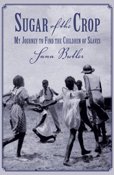America's economy was built largely on the backs of slaves, and the South's "peculiar institution" affected America's cultural development for decades. So, the story of the generation of black Americans that emerged just after slavery ended should make for one of the country's most enriching narratives. These direct descendants, who grew up as Jim Crow segregation laws were first implemented, could reveal plenty about how America came to be, and how it was.
In 1997, Sana Butler began tracking down and interviewing the children of slaves. Unfortunately, she doesn't tell their stories in her book, "Sugar of the Crop: My Journey to Find the Children of Slaves" (The Lyons Press, 2009, $24.95). Butler writes that she wanted to create more than oral history: "I wanted to get opinions on current events, put their stories within a historical context, ask why and what for when I didn't agree with something they said," she writes. "But most important, I wanted to see how slaves became husbands and wives; mothers and fathers and how they raised their children."
If Butler had done that, "Sugar of the Crop" would be valuable. Instead, Butler's focus is herself; the book emphasizes the "My Journey" aspect over anything else. She spends far more pages on her fumbling searches and resulting coming-of-age, than on the children themselves.
Throughout her book, Butler uses the children as springboards for her personal story. The author writes of a visit to meet William Lincoln Dunlap, born in 1903 to ex-slaves in California, but starts the chapter this way: "In May of 2003, I was headed to Las Vegas. Mel, a good friend from college, was turning 30 and all the girls who were still friends from school were going to party. She was the last of the New York gang to be inducted into the ‘What am I doing with my life?' club." She goes on and on about her friend and her "sweet apartment in Orange County." Only in the next paragraph does Butler write, off-handedly, that "this also meant that I could make plans to meet William Lincoln Dunlap."
The author treats the descendants almost as afterthoughts throughout "Sugar of the Crop." Instead of their stories, readers get long passages about the author dealing with her father's cancer and death, her credit card debt, her family and her impressions of the roadside as she travels.
Butler's discoveries are mostly banal and often naïve. While researching descendant Charlie Hayden in Indiana, Butler comes across references to his father's owner, Gus Hayden. Wanting to know more, she rifles through countless archives, looking fruitlessly for Gus Hayden. It's only after a multi-day search (and five pages of the book) that it dawns on her that "the Gus I was looking for was actually named Augustus. … Augustus died in 1888 and on his death certificate the family wrote the name Gus." Later on, she asks a white friend if there are whites who just don't like blacks, and her friend says "yes." Butler responds that "hearing her say it kind of hurt my feelings. No one wants to hear confirmation that people who don't know you don't like you."
Her feelings, not those of the people she documents, are most prominent. Even when she finds a genuinely interesting piece of history, Butler can't help herself. She discovers that President Abraham Lincoln established the "Legal Loyal League," a network of free blacks who infiltrated plantations to inform slaves about the Emancipation Proclamation. When pressed by a scholar to prove her findings, however, she again becomes solipsistic: "I accepted the challenge. Of course, a historian at a presidential library knew more than I did about comings and goings at the White House. However, I had something else going for me. I was hard-headed, as my parents marked me as a seventh-grader when I told my school bus driver I was going to get off at a stop I wanted, and did." And on and on it goes.
It's a shame. The slim pickings Butler reveals suggest that many of the descendants led rewarding lives and managed to overcome their heritage. Buried under Butler's self-importance are lives that every American should know about. The courageous and determined subjects of "Sugar of the Crop" deserved better than a dull, confessional memoir by a self-absorbed writer.



Comments
Use the comment form below to begin a discussion about this content.